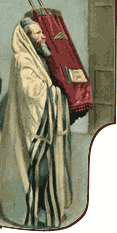


Divrei Torah Archives
Click Here For Printer-Friendly Format
Ki Tissa //rear View Mirror
|
The weekly portion Ki Tissa tells of the tragic fall of the Jewish people -- the sin of the Golden Calf. Moshe Rabenu's reaction was to smash the Tablets that he had carried down from In Slobodka, a girl was born to a good family with an unsightly birthmark behind her ear. This physical flaw caused the parents much mental anguish, as they envisioned the problems she would face in her school years and even more so when she reached marriageable age. During a period of wartime, a gentile army officer abducted the girl claiming she was his sister who was lost. One of the girl's brothers, upset by the kidnapping, ran hotly in pursuit of the officer's brigades in order to recover his captured sibling. He brazenly entered the officer's tent and demanded the return of his sister. The Officer, embarrassed by the accusation made before his fellow officers, said, "She is my long-lost sister --but if you have an irrefutable physical sign of your sister's identity --I will be glad to correct the wrong!" "Yes, she does have a sign. There is a unsightly birthmark behind her right ear which is not visible when facing her." The inspection, of course, verified her identity and she was returned to her genuine brother. Only G-d who can see the future to the end of time knew that this girl would be abducted by the gentile officer and He prepared the unsightly blemish as the "cure for the wound" before the kidnapping ever occurred. The answer Hashem gave to Moshe was that no one knows the whole picture. G-d does only good and His plan cannot be understood until the final scene is played out. "You will see My back" i.e. only after the fact can we understood the ultimate good of all that He does. Our trust in Him is our consolation. another idea Is the fact that the Jewish people were stubborn any reason for G-d to travel with them and protect them? Wouldn't it be strategically wiser for Moshe to point out a positive quality that the Jews had in order to convince G-d to grant them His divine protection? The Maggid MiDubno explains with a parable. A poor peddler chose a corner location in a wealthy neighborhood in hopes of selling his wares. In a loud voice he advertised his merchandise to the throngs of well to do passersby. Yet despite his prime location and valiant efforts to draw attention to his merchandise, at the end of the day not one of his fine wooden bowls or spoons had been sold. On his way home he met a friend and he told him about his bad luck. " Don't show off your ignorance," said his friend with disdain. "On a street where there are only the rich and the well to do, who only use utensils made of the finest gold and silver -- you cannot expect to sell bowls and spoons made of wood. Tomorrow go to the part of town where the common laborers and craftsmen shop and you will find the customers you are seeking." Moshe Rabenu zt'l pointed out to G-d all of His lofty attributes -- the Yag Midot -- 13 Traits of Mercy. Then he questioned the Almighty saying, "Do they need your 'merchandise' in Heaven? Angels don't require mercy, kindness, patience and forgiveness because they do not sin. Please walk amongst us with your qualities of kindness and mercy because we are a stiff necked people who need to make use of your "merchandise". WOULD YOU LIKE TO DEDICATE A MESSAGE IN HONOR OR IN MEMORY OF A LOVED ONE? REFUAH SHELEMA? Click Here to go to the 'Donations' area, or E-mail your dedication to RBEYDA2000@AOL.COM . You can Mail your check for: $101 - Shabbat And Holidays $52 - Weekdays Mail To: Raymond Beyda 408 Avenue O Brooklyn, NY 11230 |
||||
© Copyright 2025 Raymond Beyda Online
Dynamic Websites - Developed and Hosted by
